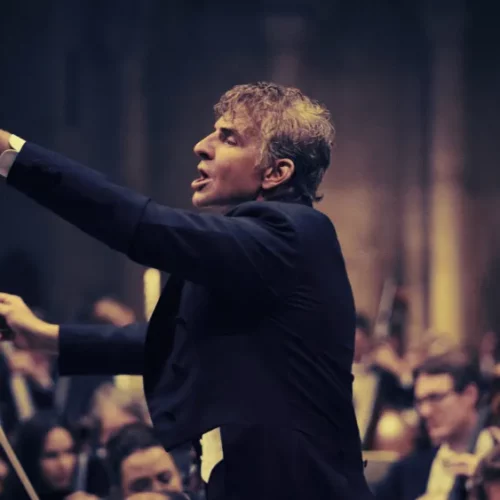
Joseph Bologne Gets His Due: “Chevalier” Creators Introduce A Compelling Character
Listen
(Runtime 4:02)
Read Transcript
For those with just a casual interest in classical music, the name Joseph Bologne might draw a blank. However, a new movie dramatizes the fascinating life of this multi-talented, eighteenth-century figure.
He was a brilliant violinist, a gifted composer and conductor, a master of fencing and shooting. A man who enjoyed the royal patronage of Marie Antoinette, as well as the respect of fellow composers Haydn and Gluck in pre-revolutionary France. Joseph Bologne was also Black, and he is now the subject of a new feature film, Chevalier, from Canadian director Stephen Williams, best known for his work in television, from Lost to Watchmen.
WILLIAMS: “The more I discovered about him, the more I felt a kind of personal connection to his story. He was born in Guadalupe and made his way, roughly at the age of 10 to France at the urging of his father. And I was born on another Caribbean island, Jamaica, and left when I was 13 and went to high school and university in England. So there were things at the macro and micro level that were tremendously compelling.”
Williams’ collaborator, screenwriter Stefani Robinson, has won awards for TV’s Atlanta. She first learned about the Chevalier de Saint-Georges as a high schooler, thanks to a book given to her by her mother.
ROBINSON: “I was really trying to understand who he was and how he was living his life. It just became very clear to me early on that he was like a rock star, right? Classical music back then was not classical music now It was just music.”
Joseph Bologne was brought to France as a boy (and a promising musical talent) by his White aristocratic father. We meet him in the film as a confident, accomplished adult–no longer on a plantation, a trope in so many stories about Black historical figures.
ROBINSON: “We want to make this movie a celebration of his life and his accomplishments, and I think if can just imply that he was at a plantation, have that be sufficient enough without having to show it. Without having to show that horrific nature and that difficultly of his early life. That was okay for us.
The Chevalier and Mozart (eleven years his junior) were housemates in Paris for a few months. They were friends, but that’s not how Robinson’s screenplay portrays them in their one scene together, as dueling violinists.
ROBINSON: “It’s based off an alleged first time that Jimi Hendrix met Eric Clapton. The story goes that Cream was playing and Jimi Hendrix was there in the crowd, and he asked to come up and play with Clapton. And it was one of things that, you know, no one ever did, no one would dare ask to do. It’s like, you don’t just try to play with Clapton. Clapton is Clapton! (laugh)”
Kelvin Harrison, Jr., plays the Chevalier with real panache in the movie. His recent credits, all in period roles, include Cyrano and Elvis. Director Stephen Williams loved his all-in approach to this character.
WILLIAMS: “He studied violin for like six hours a day for the six months leading up to the filming of the movie and continued all the way through the filming of the movie. So, it’s an immense amount of work, and commitment, and dedication, and discipline from him. “
For both Williams and Stefani Robinson, there are strong parallels in the social and historical context of the Chevalier’s story and our times.
ROBINSON: “One of the things that Stephen and I endeavored to do was to make classical music in this period feel like it wasn’t so far away because we really felt like the story wasn’t something that was just left in the past, and dead, and sort of, like, chained and handcuffed to the history books. There’s something incredibly alive about his story and about the time that he lived in. So to make it as contemporary as possible was pivotal for us.
Joseph Bologne, a highly accomplished Black man at the intersection of high art and historic revolution, now the title character of the new movie, Chevalier. It opens theatrically Friday, April 21.
Reeder's Movie Reviews:

Reeder’s Movie Reviews: Deadpool & Wolverine
Disney/Marvel Read “I don’t know anything about saving worlds, but you do.” -Deadpool addressing Wolverine The meta has overtaken the Marvel Cinematic Universe (MCU). After a six-year period marked by

Reeder’s Movie Reviews: Maestro
Biopics are notoriously fraught with difficulty. They have to achieve an emotional and intellectual resonance, as well as a period look and feel. The script has to reflect and enhance the inherent drama in the lives of its characters, and the main one really has to matter. In Oppenheimer, the British-American writer-director Christopher Nolan embraces the challenge of telling the story of the “most important person who ever lived,” as he puts it.

Reeder’s Movie Reviews: Oppenheimer
Biopics are notoriously fraught with difficulty. They have to achieve an emotional and intellectual resonance, as well as a period look and feel. The script has to reflect and enhance the inherent drama in the lives of its characters, and the main one really has to matter. In Oppenheimer, the British-American writer-director Christopher Nolan embraces the challenge of telling the story of the “most important person who ever lived,” as he puts it.
















